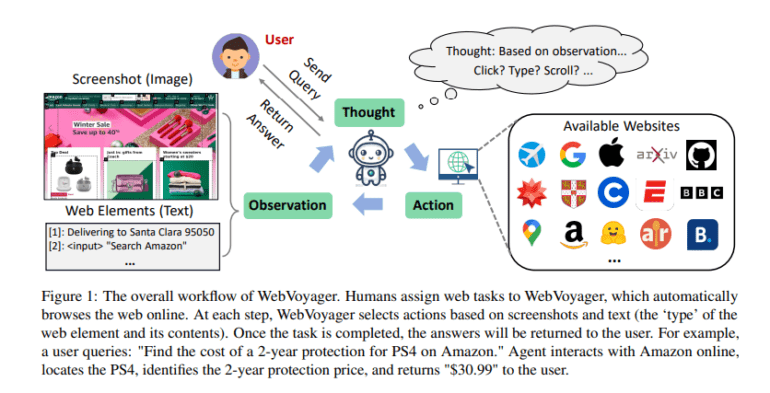TL;DR:
- Introducing WebVoyager, a cutting-edge Large Multimodal Model (LMM) powered web agent.
- WebVoyager addresses limitations faced by existing web agents in real-world web interactions.
- Collaborative research by Zhejiang University, Tencent AI Lab, and Westlake University led to WebVoyager’s development.
- The agent’s success hinges on a novel evaluation protocol, harnessing GPT-4V’s multimodal comprehension.
- WebVoyager showcases its capabilities through interaction with the Apple website.
- The evaluation set is meticulously constructed using self-instruction and human verification methods.
- WebVoyager achieves a remarkable 55.7% task success rate, outperforming GPT-4.
- Automatic evaluation using GPT-4V aligns closely with human judgment, boasting an 85.3% agreement rate.
- WebVoyager’s potential shines in conducting large-scale web agent evaluations.
Main AI News:
In the ever-evolving landscape of web agents, a groundbreaking innovation is set to redefine the rules of engagement. Meet WebVoyager, the latest in Large Multimodal Model (LMM) technology, poised to revolutionize the way we interact with the vast realm of real-world websites.
Existing web agents have long grappled with limitations rooted in their reliance on single input modalities and testing within controlled environments. These constraints, often involving web simulators or static snapshots, fail to capture the intricacies and dynamism of real-world web interactions. As a result, their practical utility falls short when it comes to navigating the diverse and ever-changing content found on actual websites.
Enter WebVoyager, a pioneering LMM-powered web agent, born from collaborative efforts by researchers hailing from Zhejiang University, Tencent AI Lab, and Westlake University. This cutting-edge agent possesses the remarkable ability to seamlessly execute user instructions end-to-end by engaging with real-world websites.
The driving force behind WebVoyager’s success lies in a novel evaluation protocol, harnessing the robust multimodal comprehension capabilities of GPT-4V. This protocol includes a comprehensive benchmark of real-world tasks drawn from 15 widely used websites. To showcase its prowess, WebVoyager takes you on a journey through its interaction with the Apple website, demonstrating a streamlined path devoid of redundant actions.
What sets WebVoyager apart is its meticulous construction of the evaluation set. Drawing from a blend of self-instruction and human verification methods, tasks are meticulously sampled and reworked from a plethora of websites to ensure both high quality and relevance. Human validation serves as the litmus test for the generated tasks, verifying that answers can indeed be found on the corresponding websites. Furthermore, the evaluation leverages GPT-4V for automatic assessment, a strategic move aimed at reducing dependence on human evaluators and trimming experiment costs.
WebVoyager has delivered impressive results, boasting a remarkable 55.7% task success rate, surpassing the capabilities of GPT-4 and its text-only variant. Notably, the automatic evaluation protocol utilizing GPT-4V aligns closely with human judgment, achieving an outstanding 85.3% agreement rate. Even in the face of formidable challenges posed by text-heavy websites such as the Cambridge Dictionary and Wolfram Alpha, WebVoyager has displayed consistent improvement with augmented information, achieving a Kappa score of 0.7, equivalent to human agreement levels. These achievements underscore GPT-4V’s potential for conducting efficient, large-scale evaluations of web agents, paving the way for a new era of web interaction.

Source: Marktechpost Media Inc.
Conclusion:
The emergence of WebVoyager, a powerful LMM-driven web agent, and its impressive success in real-world web interactions indicate a promising future for web agents. This innovation paves the way for more efficient and dynamic web interactions, offering significant opportunities for businesses and industries to streamline their online presence and services. As web agents like WebVoyager continue to evolve, the market can expect enhanced user experiences and increased automation in various online domains, unlocking new possibilities for growth and efficiency.

